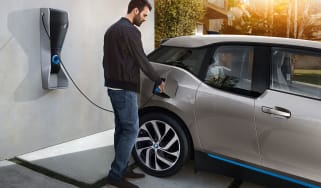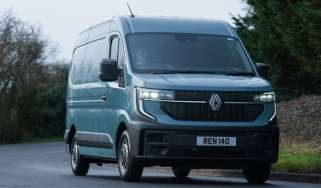Electric car smart charging explained
What is smart charging – and what are the benefits for you?
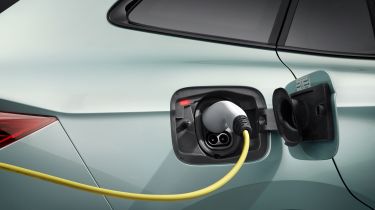
As of 30 June 2022, all domestic electric-car charging points sold in the UK will be what’s referred to as ‘smart chargers’. But saying a home wallbox has smart functionality doesn’t mean a lot on its own, so we decided to break down exactly what these capabilities are – and what benefits EV owners get from having a smart charger.
In essence, chargers like these allow you to manage your car's charging habits efficiently, with the added benefit of potentially cutting your energy bills. In the longer term, smart-charging technology will in theory allow electric-car owners to profit from the energy stored in their batteries by selling it back to their energy provider at times of peak demand or low production. Allow us to explain…
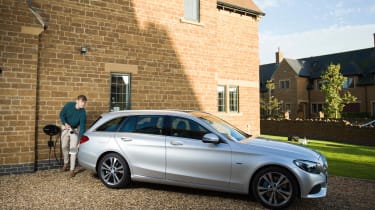
So how does smart charging work?
The UK government defines smart charging as “shifting the time of day when an EV charges, or modulating the rate of charge at different times, in response to signals (e.g. electricity tariff information)”.
In simple terms, smart chargers work using a live data connection to your car and the wallbox itself, as well as a live data connection to your electricity tariff provider. This allows the car – or rather its driver, typically using an app – to tell the charger what capacity you want your battery topped up to and by what time, each time the car is plugged in. So, you can instruct the smart charger to ‘fill ‘er up’ to 80% by 7am before you set off on your regular commute, or inform it that you only need a 60% charge by 8.20am, because you’re only doing the school run tomorrow and working from home.
What’s more, because the smart charger knows your energy tariff’s rates, it can deliver just the right amount of charge to your vehicle at the cheapest time. This is particularly handy if you have a dual-rate tariff, like those from Octopus Energy or British Gas. Some smart chargers work from basic tariff information entered by the user, while other more advanced units can sync automatically with your energy tariff. Either way, it’s a more efficient way to charge than simply plugging in when you get home.
The other side of the coin is that energy providers can alter the rate and times at which your smart charger works, to suit the changing energy levels in the power grid and help to smooth out spikes and troughs in demand. However, this will never override the essential parameters you set or leave you without juice when you need it.
Although the name is similar, the smart-charger concept is therefore a bit different to the smart electricity meters that have been fitted to houses and businesses in the UK in recent years, which simply track your usage. To save on your household bill, you need to actively change your habits or usage patterns based on the information a smart meter provides, whereas a smart charger makes the decisions for you.
Depending on which charger you choose, and your electricity provider, you can even instruct your smart charger to pick the most environmentally friendly time to charge, instead of the cheapest. For example, by specifying those times when the national grid’s green-energy producers are working at their hardest relative to fossil-fuel stations.
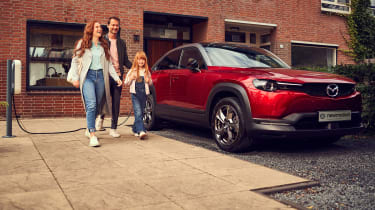
Why is a smart-charger rollout considered essential at a national level?
A trial in 2021 that monitored the charging habits of almost 700 drivers highlighted the potential problems that millions of electric cars on our roads could cause for the national grid. Shared work and commuting habits create peaks of demand when everyone plugs in their charger at once – for example, after getting home from work on a Friday. With ‘only’ around half a million electric cars currently on the road in the UK, those spikes in demand can be managed, however, it’ll be a very different story when the number of electric vehicles on our roads reaches into the millions as we approach the 2030 ban on the sale of new petrol and diesel cars.
Of course, while all those drivers may plug in at once, the chances are they’ll be connected to their chargers for many hours longer than they need to take on the required amount of charge. The idea is that smart chargers communicating with power providers will be able to help even out the peak in demand accordingly.
Another major issue that smart meters address is the production and storage of energy in a zero-carbon economy. Currently, if there’s a surge in demand for electricity, the national grid can fire up a fossil-fuel generator to cover the spike. But as the UK must rely increasingly on renewable energy sources for electricity generation, what happens if the wind drops and the turbine blades slow or stop turning?
The answer, it's believed, will be the electricity stored in the millions of parked electric cars with their batteries connected through smart chargers to the grid. New ‘vehicle-to-grid’ (V2G) technology that’s beginning to be implemented will allow smart chargers to momentarily feed power back to the grid, smoothing out troughs in supply or responding to peaks in demand when it’s no longer possible to shovel coal into a generator furnace.
How much cash can you save with a smart charger right now?
Many of the future advantages of smart chargers – especially the V2G element – are not yet sufficiently developed to be rolled out. Although plenty of companies have run successful trials, only a very small selection of electric cars have the necessary vehicle-to-grid charging capabilities. It’ll likely require some sort of concerted government or legislative effort to make things happen.
However, while you can’t yet sell juice back to your energy company, there’s every reason to take advantage of smart charging now. Estimates suggest electric-car drivers could save an average of between £200 and £250 yearly on their charging costs by ensuring they only charge ‘smartly’ at peak times.
Recommended
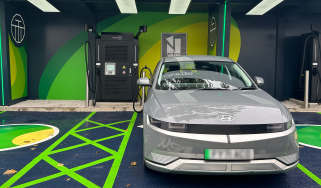
The UK’s fastest electric car charger is live, but it’s too fast for most EVs
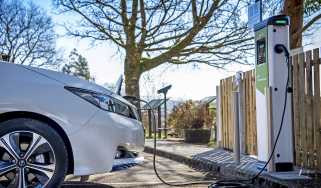
UK EV charging network grows by 47 per cent this year

Gridserve’s new lab aims to boost electric car charging point reliability
Most Popular

EV Deal of the Day: Dacia Spring is amazingly good value at £116 per month

